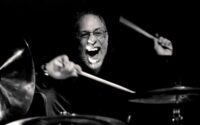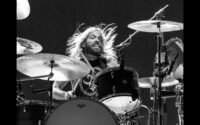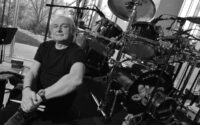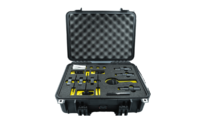During this year’s edition of the Musikmesse, held, as always, in early spring in Frankfurt am Mein, Germany, we met up with a few drummers whose skills, professional CVs and (as it turned out in eye-to-eye contact) also personalities deserve the attention of anyone interested drums, let alone rock drums.
BeatIt’s report from Musikmesse 2017
Will Hunt is an experienced drummer with numerous musical collaborations under his belt. In the last 20 years, he has worked with such acts as Dark New Day, Static-X, Mötley Crüe, Methods Of Mayhem, Staind, Slaughter, Vince Neil, Michael Sweet, Black Label Society, Vasco Rossi or Device. Currently, he is a member of Evanescence, White Noise Owl and Rival City. Evanscence will be on tour across Europe in June. Will is endorsed by such brands as Zildjian, Pearl, Remo and Vater.

Will Hunt (Evanescence) talks to BeatIt, Pt. 3
Beatit.tv: Your first pro experiences in the music business. How do you remember that today?
Will Hunt: It’s funny, man. When I was 13 lat, I saw ‘Spinal Tap’. It looked cool, the ad for it had explosions. I was like: ‘It’s gonna be a cool movie!’ not really understanding it was a spoof. Just thought it was a cool movie. When I started touring with my first band a month after I graduated from high school, we had circuit bands in the south east. My band had a semi truck, a tw-hundred-can light show, a full-blown PA. It was like an arena show in a club. We played 5-6 nights a week, 2 or 3 sets a night all year.
B: A lot of work.
W.H.: Yeah. These guys were like 25, 26 and I was 17. I got thrust into their world. We were playing anything from Led Zeppelin to Motley Crue, to the stuff that was big back then. We had big hair and spandex. Cool for a minute but what I remember was I went back and rewatched ‘Spinal Tap’ and I’m like: ‘Holy shit! I get it! This is so funny! ‘My life has become Spinal Tap! It’s happening!’. It’s so weird, man!
B: I think, in rock, that’s kind of like a measure of your success.
W.H.: It really is.
B: It has to be like that.
W.H.: If you can relate in any way to that movie, it means that you have had some sort of success because it’s about the roller coaster that it is, man. I mean, we still quote lines from that movie. In a couple of bands, I’ve had weird tours. I think there’s a scene where they’re standing in the lobby talking to each other about the singer who happened to be played by Paul Shortino (Duke Fame). He was in an all-white outfit, he’s sold out the Enormodome. Their tour manager comes up and goes: ‘I’ve got some bad news’ and one of them goes: ‘For a change’. ‘Cause there had been no good news. Funny shit, man.
B: The funny thing is they all actually played their instruments. Nigel Tuffnel and the other guys, they were musicians.
W.H.: I wouldn’t say the song writing was great.
B: But that’s a matter of taste.
W.H.: That’s part of what makes sit so good.
B: If that was really riiping stuff, it wouldn’t…
W.H.: Wouldn’t translate. You wouldn’t know if it was real or not.
B: It had to be slightly dorky.
W.H.: Totally!
B: Let’s talk about your first recording experience. That’s kind of like losing virginity in away.
W.H.: That’s tough, man! I was 18 and it was a real recording. With that same band, we did a record. There was a guy who ended up being a very big producer – a guy named John Kurzweg. This was his first foray into producing a record. He was actually a solo artist and had a record out on Atlantic and had a pretty big hit on it in the States. He wanted to produce this record so he came in. He was an all-round great musician – singer, guitar player, drummer. That’s when I really got drilled, man. I got drilled into playing less, into playing simpler, into playing less notes, into playing for the song. I mean, I remember that being brutal, very hard. I became a much better drummer after that.
B: That would have been around what year?
W.H.: 1990. I’m ageing myself… Within that same band, even though I got through that process, it was still about chopping and all this crap and not realizing that’s not playing for the song. So I had this weird experience. We were playing in Orlando, where I didn’t live at that point. Big club there, it was a Friday night gig, it was gonna be packed. I went to a music store to get my snare fixed. I was coming back to the hotel to get changed and get ready for the gig and I had this snare in my hand and a pair of flip flops on. I was walking up the stairs and I got to the top of one of the landings and I tripped. The snare was a free floater, so it wasn’t light. Steel snare, goes up in the air, I land on the ground, the snare comes back down… Wham! Right on my index finger. Which one was it? This one. Had to look at it. It broke my finger. I mean, literally, snapped the bone in half. I had to play that night. We weren’t the kind of band that would just take the time off ‘cause we all lived off of that. That night, and for the next six weeks, I played with a drum stick between my fingers, duct-taped to my hand. In that, I had to play simple. I notice when I did that there was a strange thing that happened. I started watching people in the crowd and I started noticing there’s a lot more people moving and tapping their foot now than I’ve ever seen. What’s the difference? Weird shit happens and you either see it, smell it, take it as a message or you ignore it. I took it as a message.
B: A slightly less drastic version of the lesson that Rick Allen took.
W.H.: Exactly, man!
B: That’s what he’s been saying. He had to start playing simpler and it was only for the better for the band. That’s when things started…
W.H.: The biggest record after that! Although I’m a huge Def Leppard fan from ‘High ‘n’ Dry’ and ‘Pyromania’, you’re right. I think that on ‘Hysteria’, he had to play a lot simpler. That’s when they crossed over to the masses. Something to be said about that, man.
B: Let’s talk about the differences between the recording process then and now. The digital has entered into the studios over the last twenty plus years, since the first session you did.I’m presuming back then you were recording onto tape. Probably some punch-ins if necessary, but you just had to be on it.
W.H.: You did because if not, you had a guy back there slicing tape, he’s got all this tape on his shoulders. It was more time-conservative to get it right. You had to be able to play. I think that’s why I went through the grind with that producer. By the way, that producer went on to produce all the Creed albums and Puddle Of Mud and all those bands that were big in the States. So he was no dummy. 10 years later, I worked with him again and it was a completely different experience. It was amazing. Mutual respect. You had to get it right. Now, in the digital age, you can move so much stuff around.
B: What’s your view on the digital technology and what it offers?
W.H.: In rock, we’ve come to a place where people want to hear the nuances, they want to hear a rock band. They want to hear a live thing.
B: Even if recorded separately?
W.H.: Yeah. I’ve always done that. There’s never been a time when I recorded everything live with the band. It’s always been separate.A lot of that is because you do want the separation and the clarity.But I’m embracing all of it. To me, it’s realy more about the simplicity of things and what’s gonna move people the most, what’s gonna turn people on to your music the most, what’s the best way to get this across to people. And then, you take that in a live format. Of course, you gotta be able to deliver the goods, but I also think you gotta be able to embrace the technology but not abuse it.
B: Do you agree with those who say the technology now takes away from the feel of the music?
W.H.: I’ve heard it. You can hear it! Done wrong, it absolutely does. It makes it very stale. There’s two things you can’t really get away with: drums and vocals. You can tell when a vocal track’s been autotuned. I can hear it from a mile away. It’s not ear candy to me. Just like a drummer who doesn’t move around the click a little bit is not ear candy to me. Certain bands have embraced it and it’s awesome and it’s part of their sound. Fear Factory. They were one of the first bands that just really nailed it.
B: Meshuggah…
W.H.: Those guys are just freaks! Thomas, man! Wow! I love that guy!
B: Would you actually like to finally make an album recording all together, live, in the same room with the band?
W.H.: Sure! I’m getting older so I guess i’m gonna have to get on with it if I’m gonna do it but I have aspirations of doing a heavy stoner rock band like Down. I play some guitar, the gutar player in Evanescence – Troy McLawhorn – is a great blues, heavy guitar player. We’ve got another buddy of ours in Nashville, this guy Tony. Killer Les Paul-slinging guitar player and singer. We’re like: ‘Let’s just get together in a room, take two weeks, let’s write an EP and record it live on the spot. Let’s just do it!’. Bring in the riffs! Bring in the best, coolest, southern riffs!
B: To tracks preproduced…
W.H.: Let’s just go in, set off the cool fuckin’ heavy groove riffs and just knock out! Why not?
B: Just do it, man!
W.H.: Fuckin’ A!
Drummers and Drumerettes! Will Hunt in the third part of an exclusive interview for Beatit.tv!
Share








